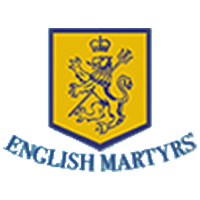English Martyrs’, formed in 1965, is a Catholic Voluntary Academy, part of the Saint Robert Lawrence Catholic Academy Trust, in the Diocese of Nottingham and admits children between the ages of 4 and 11 years.
The school vision is to educate children in the spirit of the Gospel Values and the traditions of the Catholic Church, nurturing the talents and potential of each individual. Throughout the academic year our staff, pupils and parents worked to develop a new mission statement. This reflects our beliefs and ambitions and is at the heart of all we do.
At English Martyrs’, our curriculum is centred around and driven by the children. Each half term, the children study an area of learning which is driven by an overall question, encouraging the children to think and find out things for themselves. Past examples include ‘What makes the Earth angry?’ and ‘Would you survive in Narnia?’ At the start of the topic, we work with children to find out what they already know and what they would like to know more about. This ensures that we deliver a personalised curriculum and give the children ownership of their learning.
All of the National Curriculum subjects are covered through this approach and there is a strong focus on the basic skills of reading, writing, mathematics, oracy and ICT.
As well as covering academic subjects, we also encourage the children to take responsibility for their own learning and we aim to provide them with the skills required to be a life-long 21st century learner. Here the children are shown how to be:
- Self managers
- Effective participators
- Resourceful thinkers
- Reflective learners
- Independent enquirers
- Team workers
All teaching and learning is carefully planned to ensure that the needs of all learners are met. Our work is also enhanced by a range of exciting visits and visitors – in the past we have travelled to Cadbury’s World, the Birmingham Sealife Centre and have even been visited by Queen Elizabeth I! Children are always encouraged to reflect on their learning at the end of lessons, the end of a week and the end of a topic. This maximises the potential for children to recognise the learning journey they have been on and where they would like to take their learning next.
We wanted our children to use ICT as a tool to aid their learning and not place restrictions on where or when they should learn. Basing all our teaching on a creative, mobile and adaptive curriculum we didn’t want to be hindered by the more traditional technologies. Children should be able to choose the tools and methods they want to address the variety of topics and subjects put before them.
The engaging and mobile nature of tablet technology was an obvious fit with the schools requirements but raised the issues of varying manufactures strengths and weaknesses. With the high powered apps but the lack of control and management of the IOS Platform, against the control and flexibility of lower powered Android devices there was a requirement to harness both platforms for different purposes across the school. Only having Technical Support provision for half a day a week meant that whatever solution was chosen it needed to be low maintenance and easy for staff to manage. The LearnPad App allows for all the control and management of devices across multiple platforms. Using profiles to easily manage content across a range of ages and topic areas. Allowing devices to ‘hand in’ and ‘hand out’ documents meant that devices could be used for a variety of task including the collation and annotation of digital ‘Learning Journeys’.
The set up of devices by QR Code couldn’t be easier and meant that the days of sitting down typing in WIFI keys into each device are long gone. Once enrolled and added to the school network all updates and changes could then be managed centrally. Resources, apps, web links and even children’s work could be added to a profile and sent to the devices remotely. The ability to change from one profile to another using the central management system or QR Keys meant that the devices were truly personalised for the class or individual using them. No longer was the need to encourage children away from their favourite apps and back onto the activity set you just removed whatever wasn’t required from their profile. Having, free apps, existing content and staff resources available on the devices made the roll out across school a quick and simple process. An Early Years member of staff could use their EYFS tracker and apps in the morning but after lunch a keyboard could be plugged in for a focused writing session with Year 6.
The Year 6 children have used the devices for an animation club creating their own endings to their favourite stories, whilst the Years 1’s have used free apps such as Pic Collage to record their Learning Journeys and gather digital evidence. QR Codes in the corner of display boards allows staff to load extension activities for different topics or abilities. The LearnPad App allows the use of engaging and exciting apps and devices but with the reassurance of the control and management of traditional ICT resources. Devices are always available for the children to learn wherever and however they like.


